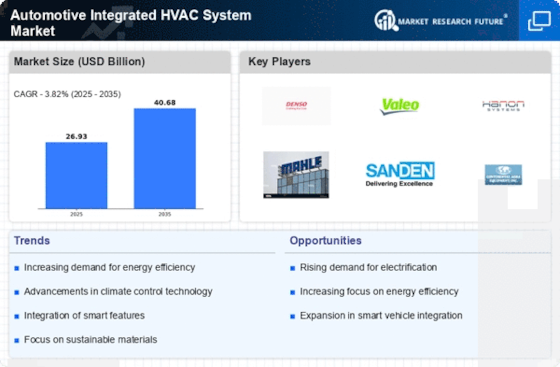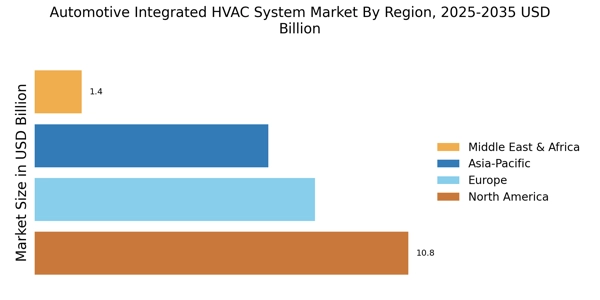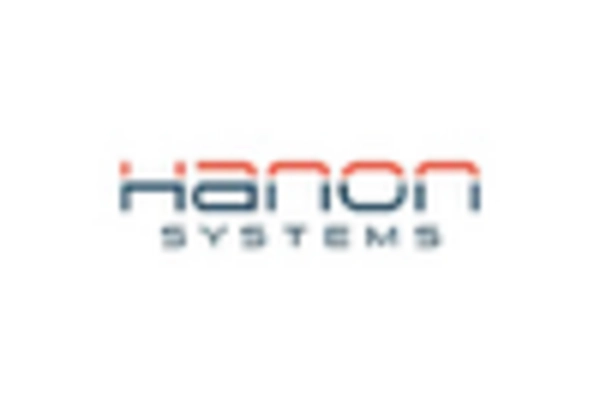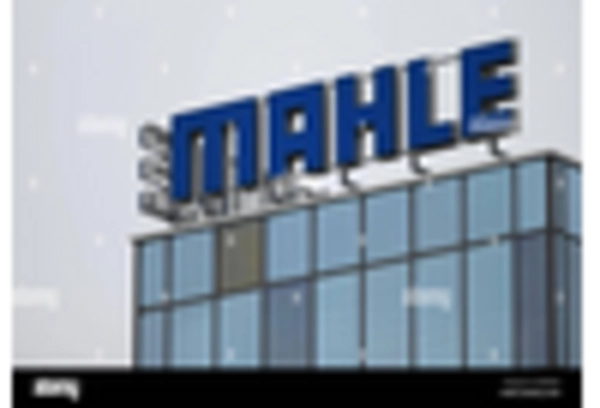Growing Focus on Air Quality
The growing awareness of air quality and its impact on health is significantly influencing the Automotive Integrated HVAC System Market. Consumers are becoming more concerned about the quality of air within their vehicles, leading to a demand for advanced filtration systems and air purification technologies. Reports suggest that vehicles equipped with high-efficiency particulate air (HEPA) filters can reduce airborne pollutants by up to 99%. This heightened focus on air quality not only enhances passenger comfort but also aligns with broader health trends, prompting manufacturers to innovate and improve their HVAC offerings in response to consumer expectations.
Advancements in Energy Efficiency
Energy efficiency remains a pivotal driver in the Automotive Integrated HVAC System Market. With rising fuel costs and growing environmental concerns, manufacturers are increasingly focusing on developing HVAC systems that consume less energy while maintaining performance. Recent advancements in variable refrigerant flow technology and heat pump systems have shown potential to reduce energy consumption by up to 30% compared to traditional systems. This shift not only appeals to eco-conscious consumers but also aligns with regulatory pressures for improved fuel economy, further propelling the Automotive Integrated HVAC System Market.
Integration of Smart Technologies
The integration of smart technologies into automotive HVAC systems is transforming the Automotive Integrated HVAC System Market. Features such as automatic climate control, smartphone connectivity, and voice-activated commands are becoming standard in modern vehicles. This trend is supported by data indicating that over 50% of new vehicles are now equipped with some form of smart technology. As consumers increasingly expect seamless connectivity and personalization in their driving experience, automotive manufacturers are investing in innovative HVAC solutions that incorporate these technologies, thereby enhancing the appeal of their vehicles and driving market growth.
Rising Consumer Demand for Comfort
The Automotive Integrated HVAC System Market is experiencing a notable increase in consumer demand for enhanced comfort features within vehicles. As consumers become more discerning, they seek vehicles equipped with advanced HVAC systems that provide optimal temperature control and air quality. This trend is underscored by a report indicating that nearly 70% of consumers prioritize climate control features when purchasing a vehicle. Consequently, automotive manufacturers are compelled to innovate and integrate sophisticated HVAC technologies to meet these expectations, thereby driving growth in the Automotive Integrated HVAC System Market.
Regulatory Pressures for Emission Reductions
Regulatory pressures aimed at reducing vehicle emissions are a critical driver in the Automotive Integrated HVAC System Market. Governments worldwide are implementing stringent regulations to curb greenhouse gas emissions, compelling automotive manufacturers to adopt more efficient HVAC systems. These regulations often require the integration of technologies that minimize refrigerant leakage and enhance overall system efficiency. As a result, manufacturers are investing in research and development to create HVAC solutions that comply with these regulations while also appealing to environmentally conscious consumers, thereby fostering growth in the Automotive Integrated HVAC System Market.

















